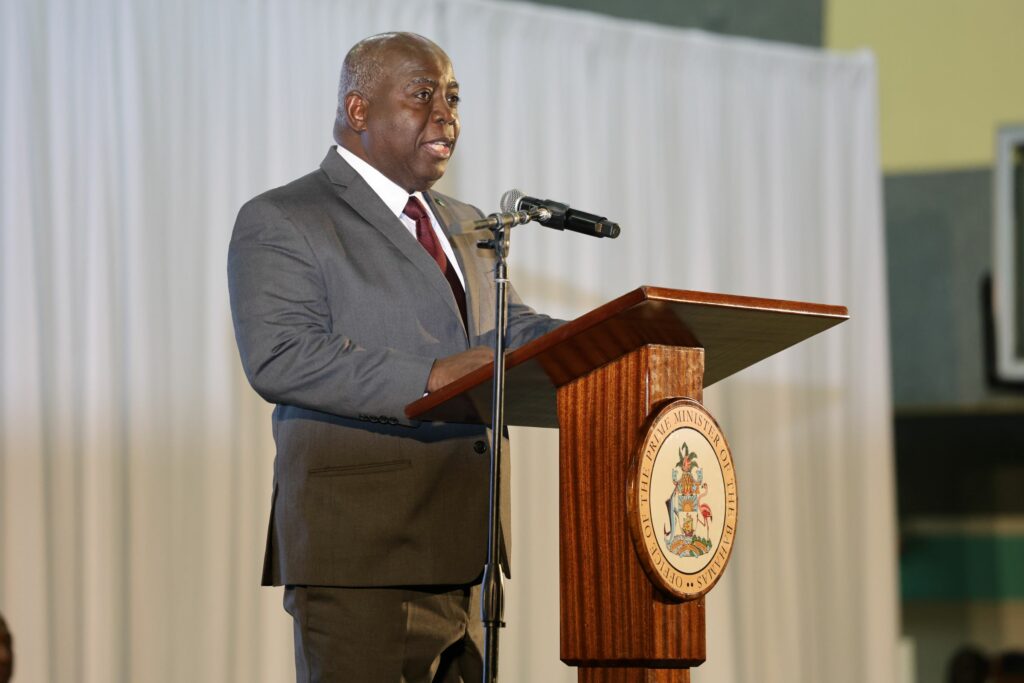
Good evening.
It is wonderful to be with you tonight.
I am very pleased to see so many friends here, including some who first welcomed me here when I was a young attorney.
I’m counting on you being polite not to point out how long ago that was.
Those were very happy and productive times.
Living and working here gave me a strong and enduring connection to this island and to her people, and a real understanding of why Grand Bahamians insist – no matter the disappointments and heartbreaks which have accumulated over the years – that Grand Bahama is unique, and that your best days still lie ahead.
I understand, and I agree. That’s why I’m here tonight.
I know there is a lot of interest in recent developments.
I’m grateful for this opportunity to share with you how we arrived at this moment, how we view the stakes of the current situation, and how the participation of licensees and community stakeholders will be crucial in building the best path forward.
I will not review in great detail the history of Freeport and the Grand Bahama Port Authority, both because that history is well-known to many of you, and because I know you’re here to focus on the future, not the past.
But if you’ll permit me a brief look backwards, I do believe history has something to teach us.
Because even in the earliest years of Freeport’s history, following the 1955 signing of the Hawksbill Creek Agreement, both the promise and the peril of that arrangement were apparent.
After all, the Agreement was forged between a colonial government and an American businessman. The government did not have the resources to develop Grand Bahama into a full-fledged economy, and so offered extraordinary concessions to those who did, ceding significant sovereignty to foreigners looking to turn profits. People like me – and people like you – were neither present nor meaningfully represented in the rooms where this Agreement was negotiated.
Yet there can be no question that the arrangement allowed Freeport to develop quickly, in ways that would have otherwise been impossible. The long-term tax concessions and development rights gave major players the confidence to build a deep-water harbor and the infrastructure necessary for turning a sparsely-populated island into a significant economic center, one that soon boomed with activity and industry. Not every initiative in those years succeeded. But many did. And where there had once been only pine barrens, there were roads and factories and opportunities.
That’s what a public-private partnership can deliver.
But the perils of ceding authority to investors with no particular commitment to our people or country – those were also present nearly from the start.
The oil terminal and refinery, the huge cement plant — these churned out huge profits for their private owners and operators – while polluting our air and water.
The 1955 Agreement specified that the Port Authority was responsible for the education of Bahamians living within Freeport’s boundaries. Perhaps not coincidentally, the vast majority of workers found themselves living outside of those boundaries.
99% of real estate sales in Freeport during those early years were to non-Bahamians. And 15 years in, only 155 of 1400 licenses were held by Bahamians.
A 1965 Supplement to the original agreement granted the Port Authority an additional 150,000 acres for development, on top of the original 50,000, but required that they build one thousand units of low-and-middle income housing within the concession area. A Royal Commission of Inquiry report published several years later found that the Port had not lived up to this obligation, nor the obligation to invest in local farming projects.
In July of 1969, Prime Minister Lynden Pindling spoke at the official opening of the Bahamas Oil Refinery Company (BORCO). The speech he gave that day has long been considered consequential. His stirring language asserting authority over immigration and work permits in Freeport was viewed by many as a critical reason the city never again grew at the same pace.
He did not mince words, saying:
In this City where, regrettably almost anything goes, where, promisingly, some economic opportunities have come to Bahamians, Bahamians are nevertheless, still the victims of an unbending social order which, if it now refuses to bend, must now be broken.
I have no doubt that he was as furious as his words suggest. He and his generation fought for dignity and justice, for Majority Rule and Independence – they fought and won! Yet the second biggest Bahamian city was run by non-Bahamians. The segregation and the degradation were so terrible that observers compared conditions to apartheid South Africa.
Undeniably, his words had revolutionary undertones. Yet Sir Lynden was a pragmatist as well as a patriot: he said those words while welcoming a major new foreign investor, not storming the barricades.
Do any of you fault him for having the courage to point out that the canals built by developers had deprived local communities of the clean freshwater they had always relied upon?
Was the Bend or Break speech, as it came to be known, responsible for the subsequent decline of Freeport? Or was the worldwide recession which began that year, and deepened the next, more to blame?
Perhaps one day economists and historians will address this question with empirical rigor.
I raise his speech tonight not to make claims about its economic impact in that era.
Instead, I am making a claim that the reaction to that speech – made 55 years ago – continues to echo today.
Because in the decades that followed, it became conventional wisdom – an article of faith, especially among Bahamian elites – that it is too risky for the Bahamian government to insist that the Port Authority live up to its Hawksbill Creek obligations.
Elected representatives of the people who have challenged the Port Authority to do more have been chastised for their impertinence, warned that they would be responsible for once again killing the magic, and scaring away investors.
Tonight I’m asking you:
Have decades of deference delivered you to the Promised Land?
Where’s the magic? Where’s the prosperity that’s supposed to be the reward for submission?
How many Bahamians have been enriched and empowered? Enough to justify the billions in concessions?
Maybe the problem is not that successive governments have asked too much from the Port Authority, but rather that governments have asked for too little.
I have had enough of the scare tactics !
Now, I have had the distinct privilege of being your Prime Minister for a little more than two and a half years. In that time, I have worked with my colleagues to promote our nation and our national interest relentlessly – building alliances, fighting for fair climate finance, fighting to get us off the blacklist, fighting for fair treatment, working to make sure our voice and our interests are represented.
Tell me something — does it make sense to you that we would fight for you around the world – but not fight for you here at home?
I don’t mean to imply that we came in looking for conflict. Everyone who knows me knows I start with consultation and cooperation, not confrontation.
But by July of 2022, I decided to meet with the main shareholders of the Port Authority myself. I let them know that we didn’t intend to let the stagnation and deterioration of Grand Bahama continue, and that we were prepared to enforce the reimbursement clause of the Hawksbill Creek Agreement.
A month later, in August, we followed with a letter, advising that we planned to send the first invoice for reimbursement in October of 2022, which we did on the third day of that month.
Pardon me for walking you through the details here – I want to establish that the Port Authority had more than ample notice, and yet they still felt no compulsion to persuade us they intended to be true partners for progress.
Look at the facts.
Look at the breaches in the seawalls along the Grand Lucayan waterways, look at the unusable public ramps fisherman need to lower their boats into the water, look at the erosion of the public beaches.
Look at the area some call the ghetto – just yards from the Pink Building.
Look at the bridge leading into East Grand Bahama, still not fully repaired.
Downtown Freeport was dead for 20 years– with empty lots, the shuttered and derelict buildings. It is our administration that is bringing downtown back.
We are addressing the dysfunction, and all the legacy issues they have neglected.
And you know, some things are really a big deal to me.
They sold the West Sunrise Highway, between the International Bazaar and Princess Properties. They sold a highway to a private developer! Leading to the Bazaar’s deterioration.
During Dorian, they opened a non-profit to distribute donations sent by others. All the decades of concessions, and that is what they contributed, when we were at our lowest moment?
And let’s talk about home repairs for a moment. Do you know that there have been multiple cases where the government has tried to help with home repairs, but the Port Authority has blocked the help, insisting they cannot permit it, if the contractor or homeowner is behind on licensing fees or service charges?
How can people who behave like this be our partners?
There is just too much evidence that they care more about their infighting and shareholder lawsuits than our people.
This is what happens when cities are treated like family heirlooms, passed down without a thought as to whether those inheriting are willing to serve the interests of our communities over their profits.
They’ve divested themselves of key assets – sold for private profits the very assets that would allow them to develop the economy in Freeport, as they are required by law to do. They sold the road building company, the harbor company, the utility company, the power company, even the sanitation company.
They were happy to offload the airport to my predecessor, who somehow consented for the Bahamian taxpayer to take on the liability of rebuilding the airport.
When the Port Authority owned all of these assets, they had a credible argument to make to investors.
But now?
Now they appear primarily to be in the license fee-collecting business.
I don’t know what they did with all the money they made from selling off all those companies – but I know what they didn’t do: they didn’t invest in the climate-resilient infrastructure Grand Bahama needs in this new climate era of intensifying hurricanes.
And speaking of selling off these critical subsidiaries….I don’t recall them asking those of you who are licensees for your consent?
Yet any material change to the Hawksbill Creek Agreement requires four-fifths approval of licensees.
They’re leaning on you, collecting your fees, but they’ve sold off the assets that would allow them to bring the kind of game-changing investments that are so overdue in Grand Bahama.
They haven’t kept their obligations to you, and they haven’t kept them to Bahamian taxpayers more broadly, either.
As I alluded to earlier, when the government pays the salaries of the many people delivering public services within Freeport, the Port is responsible for reimbursing the government, for any amounts spent beyond the customs taxes paid in the Port.
In my meetings with them, I was clear:
Whatever has transpired in the past, my government is not prepared to subsidize your private profits with public money.
The Port Authority’s position is that this provision has never before been enforced.
Our position is that this unfortunate fact in no way removes their obligation under the law.
On the 26th of March, we sent the Port Authority an invoice covering the last five fiscal years.
The invoice says they owe $357 million.
The Port Authority response: They owe nothing.
The claim for $357 million was supported by a detailed audit, prepared by international firm PriceWaterhouseCoopers.
Their claim they owe nothing was supported by…nothing.
Both parties are now proceeding along the mutually agreed-upon path following the sunset of 30 days’ notification.
But let me tell you something, since March 26th, none of the many investors we’re working with, across a range of projects, here in Grand Bahama or on any other island, have objected, or retreated, or raised any concerns. Or even raised an eyebrow!
That’s because good investment partners don’t fear governments who enforce contract terms.
So, let’s leave fear in the past.
Let’s go forward with confidence.
Let’s liberate Grand Bahama from the purgatory of unrealized potential!
You have waited too long for vision and growth and innovation.
From the Carnival Port to the Shipyard Expansion to a new MSC port, big things are finally in motion. Construction of the Freeport Health Campus is underway. The airport is, too!
Yes, the Port Authority is the licensing entity. But we’re doing the work – and none of the parties or public relations they’re running now can erase a record of neglect.
We give the Port Authority extraordinary concessions – in return, we should get extraordinary growth. Instead, Grand Bahama’s economy has lagged behind other islands.
The Port Authority collects your license fees. But they long ago stopped earning them.
I cannot explain why the current shareholders are not more productive partners for Grand Bahama.
It was not always thus. I know many remember Sir Jack Hayward and Edward St. George with respect and affection.
Public-private partnerships can yield great benefits, benefits that otherwise would not be possible, when the partners are the right ones, when the arrangement suits the times, and when the government is not afraid to stand on the side of the people.
Like Sir Lynden, I am both a patriot and a pragmatist. The Bahamas has been battered by four Category 4 and 5 storms in under a decade – no one knows that better than you do. Those storms cost us billions – and the debt we had to incur to rebuild and recover is expensive, with interest rates that reflect our growing climate risk. We are paying for the hurricanes of the past and the hurricanes of the future.
We lost a lot of ground with the pandemic. The global inflation crisis hit our import-dependent islands hard. This vulnerability to external shocks means that the government does not always have the resources to match our ambitions for the country.
That’s why we work hard to promote The Bahamas, and to find world-class partners for the next stages of our development.
Imagine what Grand Bahama could be if the licensees and the government had the right partner.
You know what we have now, that the licensees of the 60’s and 70’s did not?
Several generations of educated Bahamians, who are now contributing their talents and expertise to enterprises and endeavors abroad, but who would gladly live and work here, if they believed in the opportunities – if they believed they could build a safe and secure future here.
I remember when Freeport was called the Magic City. It wasn’t just the investments that made it thrive—it was the energy and ambition of young Bahamians who believed they could create something spectacular. That spirit hasn’t vanished; it’s just been stifled. It’s time to unleash it once more.
Every era brings new challenges and new possibilities, and when old arrangements do not serve – it is not just our right but our obligation to ask – how can the people be better served? How can we close the gap between potential and reality?
That brings me to all of you in this room.
You are critical to the way forward.
Let me be clear: we will never take steps that water down any of the rights or privileges or benefits you enjoy now.
I have an open door, and an open mind, about what comes next.
The only thing I’m not open to is the status quo.
I started by saying I saw a great many old friends here.
I hope soon to count many of you as new ones, as we work together to build a better way forward.
You deserve flourishing, thriving communities.
You deserve an inclusive economy that generates opportunity, dignity, and security.
Let’s restore the magic. Let’s break the chains that have held back Grand Bahama for too long. Let’s build a city that finally, truly works for every one of you.






![A Con Artist [RACIST] wants Bahamians to fight progress – WELL, WHAT IS THIS?!](https://www.bahamaspress.com/wp-content/uploads/2025/07/Toby-Smith-218x150.jpg)
